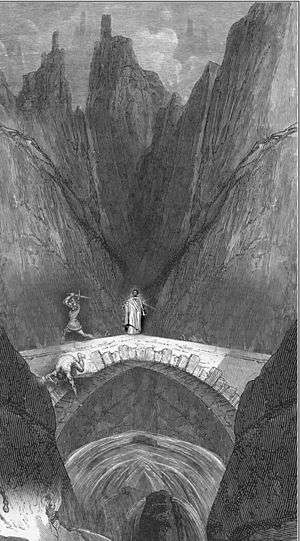Paradox of nihilism
Paradox of nihilism is the name of several paradoxes.
Meaning
According to Hegarty, the paradox of nihilism is "that the absence of meaning seems to be some sort of meaning".[1]
Truth
Niklas Luhmann construes the paradox as stating "that consequently, only the untrue could be the truth".[2] In a footnote in his PhD thesis, Slocombe equates nihilism with the liar paradox.[3]
Religion
Rivas locates the paradox in the "conservative attitude of Roman Catholicism" developed in reaction to Nietzschean nihilism, in that it "betrays a form of nihilism, that is, the forced oblivion of the real ambiguity and the paradox that inform the distinction between the secular and the sacred".[4]
Critical legal theory
In Critical Legal Studies (CLS) theory, the arguments used to criticize the centrist position also undermine the position of CLS.[5]
Ethical nihilism
According to Jonna Bornemark, "the paradox of nihilism is the choice to continue one's own life while at the same time stating that it is not worth more than any other life".[6] Richard Ian Wright sees relativism as the root of the paradox.[7]
See also
References
- ↑ Hegarty, Paul (2006). "Noise Music" (PDF). The Semiotic Review of Books. 955 Oliver Road, Thunder Bay, Ontario, Canada P7B 5E1: Department of Sociology, Lakehead University. 16 (1-2): 2. ISSN 0847-1622. Retrieved 4 April 2010.
Failure/impossibility: noise is only ever defined against something else, operating in the absence of meaning, but caught in the paradox of nihilism – that the absence of meaning seems to be some sort of meaning.
- ↑ Luhmann, Niklas (1 February 2002). "2 The Modernity of Science". In Rasch, William; Bal, Mieke; de Vries, Hent. Theories of Distinction: Redescribing the Descriptions of Modernity. Cultural memory in the present. William Rasch (introduction), translations by Joseph O'Neil, Elliott Schreiber, Kerstin Behnke, William Whobrey. Stanford University Press. p. 64. ISBN 978-0-8047-4123-1. OCLC 318368737. Retrieved 4 April 2010.
... the loss of reference had to appear as a loss of truth, resulting in the paradox of “nihilism,” which states that consequently only the untrue could be truth.
The quoted chapter was originally published as Luhmann, Niklas; Behnke, Kerstin (1994). Oppenheimer, Andrew, ed. "The Modernity of Science". New German Critique. New York: TELOS Press (61 Special Issue on Niklas Luhmann (Winter 1994)): 9–23. ISSN 1558-1462. JSTOR 488618. OCLC 50709608.
There is a 2002 review of the book in Canadian Journal of Sociology Online. - ↑ Slocombe, Will (September 2003). "Postmodern Nihilism: Theory and Literature". PhD theses from Aberystwyth University. University of Wales Aberystwyth: 154. hdl:2160/267.
'There is no truth' is not inherently paradoxical. If it is considered true, then it creates a paradox because it is therefore false. However, if it is considered false, then no such paradox exists. Therefore, it is only when considered true that it creates a paradox, in much the same way as critics suggest that nihilism must be invalid for this very reason. Having now introduced this stronger formulation of nihilism, from this point on nihilism can be considered equivalent to the statement that 'This sentence is not true'. (footnote 110)
A revised version was published as Slocombe, Will (2006). Nihilism and the Sublime Postmodern : The (Hi)Story of a Difficult Relationship From Romanticism to Postmodernism. Routledge. ISBN 978-0-415-97529-2. OCLC 62281496. Retrieved 5 April 2010. - ↑ Rivas, Virgilio Aquino (2008). "The Role of the Church in the Politics of Social Transformation: The Paradox of Nihilism" (PDF). Политикологија религије (Politics and Religion). 11000 Beograd (Belgrade, Serbia): Centar za proučavanje religije i versku toleranciju, 27.marta 95 (Center for Studies of Religion and Religious Tolerance). II (2): 53–77. ISSN 1820-659X. Retrieved 4 April 2010.
- ↑ Belliotti, Raymond A. (1987). "critical legal studies: the paradoxes of indeterminacy and nihilism" (PDF). Philosophy & Social Criticism. 13 (2): 145–154. doi:10.1177/019145378701300203. Retrieved 4 April 2010.
... Critical Legal Studies Movement (CLS) ... CLS' view generates a "paradox of nihilism" which CLS has recognized and tried unsuccessfully to resolve.
(subscription required)
Belliotti, Raymond A. (25 January 1994). Justifying Law: The Debate Over Foundations, Goals, and Methods. Temple University Press. p. 169. ISBN 978-1-56639-203-7. Retrieved 4 April 2010.The argument supporting CLS' attack on centrist ideology, adhering as it does to social contingency, jurisprudential indeterminacy, and pervasive conditionality flowing from the fundamental contradiction, seems to preclude CLS from establishing a normative justification for its own vision. CLS' critical attack seems to cut the heart from all efforts to provide non-question-begging adjudication of epistemological and moral truth claims. This nihilistic paradox, in which CLS' critical attack is so extreme that it prohibits CLS from constructing persuasively its own alternative vision, ...
line feed character in|quote=at position 440 (help) - ↑ Bornemark, Jonna (2006). "Limit-situation: Antinomies and Transcendence in Karl Jaspers' Philosophy" (PDF). sats - Nordic Journal of Philosophy. 7 (2): 64. ISSN 1600-1974. Retrieved 5 April 2010 – via http://www.academia.edu/2059731/Limit-situation_Antinomies_and_Transcendence_in_Karl_Jaspers_philosophy.
- ↑ Wright, Richard Ian (April 1994). "The Dream of Enlightenment: An Essay on the Promise of Reason and Freedom in Modernity" (PDF). University of British Columbia. Retrieved 5 April 2010.
But essentially these values can be negated by extending the same critical methods which Marx uses to negate earlier philosophical idealism and liberal bourgeois ideology. In other words, from a Nietzschean perspective, Marx's foundational principles are not sufficient to defend his humanistic values. Thus it can be argued that they still maintain the residue of the Christian ethics and Platonic metaphysics which have permeated western thought for several thousand years and which continue to provide modem thinkers with many of their illusory presuppositions. Nevertheless, one is justified in asking: Without such presuppositions, does not the critique of law, politics, or "this earth" lose its ultimate justification or meaning? How can one critique laws without holding on to a sense of justice? And herein lies the crux of the paradox of nihilism. If nihilism is the basis of human existence then all values are relative, and as such, particular values can only be maintained through a "will to power." (page 97)
